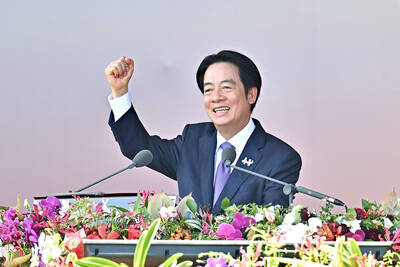The board of Taiwan Television Enterprise (TTV) yesterday announced another delay in the reshuffle of their board, deciding to hold a shareholder meeting on August 18 to complete a change in personnel.
The additional delay, a source close to the new government said, meant that the controversial appointment of Lai Kuo-chou (
"Lai's chances of beating Cheng Feng-shih (
"Although the government holds 48 percent of TTV's shares, it still cannot beat out other private shareholders that have long maintained a good relationship with the KMT [and could throw their support behind Cheng]."
If Lai didn't run, Cheng is widely seen as the likeliest candidate to win the position.
"This is why Chen Shui-bian's (
Lai, director-general of the KMT's Department of Youth Affairs, became active in politics during Lee's terms as president and KMT chairman. He has a PhD in journalism from National Chengchi University, where he also taught. He was also previously in charge of the National Press Council.
Lai's supporters say that his professional credentials are appropriate for the job, while his opponents have been critical, saying that Lai has benefited from his relationship with Lee's family and that his academic accomplishments are few.
Commenting on recent personnel rumors, the current chairman, Cheng, yesterday said that the next-term chairman must be supported by TTV's shareholders.
The TTV Union yesterday restated its opinion that the personnel reshuffle should be accomplished as soon as possible.
"We don't care who the chairman will be but hope that the person is professional," said spokesman of the Union Ho Wen-chuan (
TTV's shareholder meeting was originally scheduled to be held on May 8 -- just two weeks before President Chen took office.
The meeting, however, was delayed after members of the then incoming government protested the last-minute reshuffle just prior to the inauguration. The meeting was still held, but very few members of the board dared to show up and be seen going against the incoming government's wishes.

The Ministry of the Interior (MOI) is to tighten rules for candidates running for public office, requiring them to declare that they do not hold a Chinese household registration or passport, and that they possess no other foreign citizenship. The requirement was set out in a draft amendment to the Enforcement Rules of the Public Officials Election and Recall Act (公職人員選舉罷免法 ) released by the ministry on Thursday. Under the proposal, candidates would need to make the declaration when submitting their registration forms, which would be published in the official election bulletin. The move follows the removal of several elected officials who were

FOUR DESIGNATED AREAS: Notices were issued for live-fire exercises in waters south and northwest of Penghu, northeast of Keelung and west of Kaohsiung, they said The military is planning three major annual exercises across the army, navy and air force this month, with the navy’s “Hai Chiang” (海強, “Sea Strong”) drills running from today through Thursday, the Ministry of National Defense said yesterday. The Hai Chiang exercise, which is to take place in waters surrounding Taiwan, would feature P-3C Orion maritime patrol aircraft and S-70C anti-submarine helicopters, the ministry said, adding that the drills aim to bolster the nation’s offshore defensive capabilities. China has intensified military and psychological pressure against Taiwan, repeatedly sending warplanes and vessels into areas near the nation’s air defense identification zone and across

SENATE RECOMMENDATION: The National Defense Authorization Act encourages the US secretary of defense to invite Taiwan’s navy to participate in the exercises in Hawaii The US Senate on Thursday last week passed the National Defense Authorization Act (NDAA) for Fiscal Year 2026, which strongly encourages the US secretary of defense to invite Taiwan’s naval forces to participate in the Rim of the Pacific (RIMPAC) exercise, as well as allocating military aid of US$1 billion for Taiwan. The bill, which authorizes appropriations for the military activities of the US Department of Defense, military construction and other purposes, passed with 77 votes in support and 20 against. While the NDAA authorizes about US$925 billion of defense spending, the Central News Agency yesterday reported that an aide of US

NATIONAL DAY: The ‘Taiwan Dome’ would form the centerpiece of new efforts to bolster air defense and be modeled after Israel’s ‘Iron Dome,’ sources said President William Lai (賴清德) yesterday pledged to strengthen the nation’s air defense capabilities and build a “T-Dome” system to create a safety net against growing military threats from China. “We will accelerate our building of the T-Dome, establish a rigorous air defense system in Taiwan with multi-layered defense, high-level detection and effective interception, and weave a safety net for Taiwan to protect the lives and property of citizens,” he said in his National Day address. In his keynote address marking the Republic of China’s (ROC) 114th anniversary, Lai said the lessons of World War II have taught nations worldwide “to ensure that